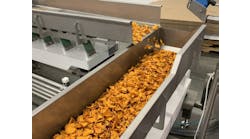One of the best places to start your maintenance program is checking to make sure that there are no obstructions that could limit the free flow of air into the system. Basically, any obstruction to the free flow of air would make the system operate with less efficiency. In addition to checking for free flow of air, you should regularly review your air intake location to ensure you have eliminated any possible source of contaminants being pulled into you air system. Follow up these inspections by regularly reviewing your schedule for filter replacement to ensure compliance with your sanitation requirements.
For hydraulic fluids maintenance:
- Keep them cool (below 140°F)
- Keep them clean (75 percent of hydraulic failures are caused by dirty fluid)
- Keep them dry
- Repair fluid leaks immediately (if oil can leak out, contamination can enter the system in the same place).
As for preventive maintenance programs: Whenever you clean the fans, you should lubricate the fan bearings, motor and shutters. Any parts that do not move freely should be replaced, however the primary issue here is to ensure that the fan blades, fan housing and shutters are clean. For optimal ventilation, you should regularly calibrate thermostats to ensure that fans operate according to the prescribed environmental conditions.
Providing the proper maintenance of ventilation systems is important to plant operations in three basic ways. First, it helps to ensure lower housekeeping costs by not pumping dirty air into the operating area being ventilated. Second, it saves on energy cost because when air moves unobstructed by dirt and grime the blowers and fans do not cycle as long or as often, and if motors and drives do not work as hard, less energy is consumed by the system. Last, well maintained and cleaned ventilation systems impact product quality by limiting contaminants in the production area and improving employee productivity by providing clean work areas and fewer lost man-hours due to sickness.


